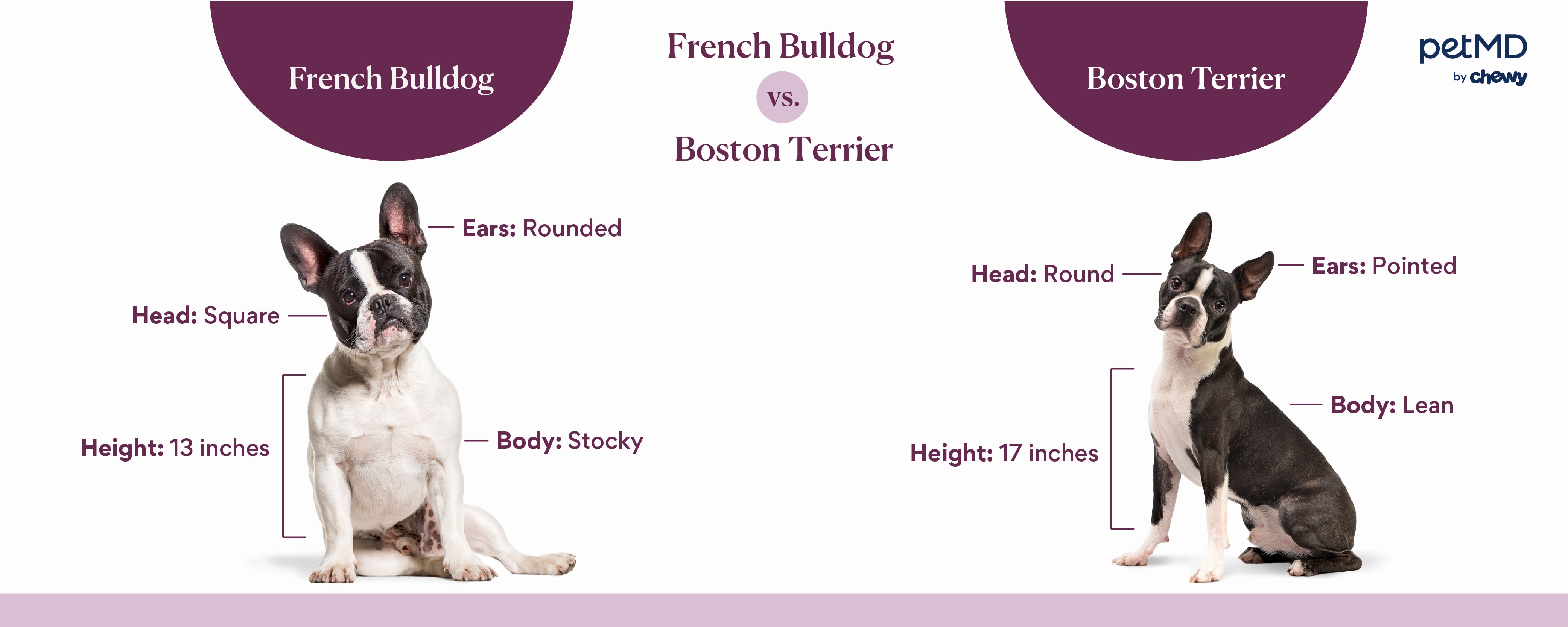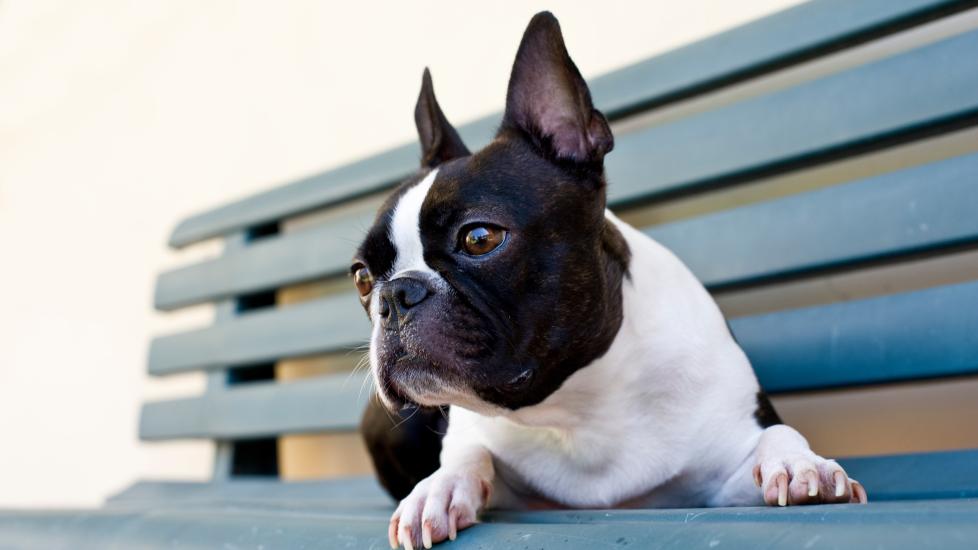French Bulldogs vs. Boston Terriers: How They’re Different
You’re walking down the road when you spot it: a small, black-and-white dog with a short snout and big ears trotting happily alongside his pet parent. You immediately identify the pup as a Boston Terrier, but your friend exclaims, “That’s a cute Frenchie!”
Although the Boston Terrier and the French Bulldog are often hard to distinguish due to their similar build and markings, they each have specific features that set them apart.
French Bulldog vs. Boston Terrier: History
The Boston Terrier and the French Bulldog look alike because they share a common ancestor: the Bulldog.
However, Frenchies—as the name implies—were developed in France in the 19th century by English immigrants who wanted smaller lap dogs than the Bulldogs they brought with them. As the popularity of Frenchies grew throughout France, Americans visiting the region noticed the new dogs and brought them to the U.S., according to the French Bulldog Club of America. Currently, Frenchies are America’s most popular dog breed.
Similarly named after their place of origin, the Boston Terrier is from Boston. The first Boston Terrier immigrated to the U.S. in the 1800s and was a cross between an English Bulldog and the now-extinct White English Terrier, according to the Boston Terrier Club of America. Initially, breeders were hoping for a more compact and stronger fighting dog in the Boston Terrier but ended up producing a dog with a gentle temperament. Also known as the American Gentleman, the Boston Terrier’s nickname is a nod to their classic tuxedo coat and kind nature.
French Bulldog vs. Boston Terrier: Appearance

Boston Terriers and Frenchies look alike thanks to their short snout, flat face, big eyes, and small stature. But if you look closely, there are distinct differences between the two breeds.
-
Ears: Boston Terriers have pointed ears, whereas a Frenchie’s ears are bigger and more rounded.
-
Head shape: Boston Terriers have a rounder head, while Frenchies have a square head.
-
Body: Boston Terriers have a lean, light body, generally reaching a weight of less than 25 pounds. Frenchies have a stockier body and can weigh up to 28 pounds.
-
Height: Boston Terriers are taller, at a maximum height of 17 inches, compared to the French Bulldog’s maximum height of 13 inches.
-
Coat colors: Both breeds can come in black and white, adding to the confusion. But Boston Terriers tend to have symmetrical tuxedo markings, while the Frenchie coat can be solid or have more patches. Boston Terriers may have brindle or seal colorings in place of the black. Frenchies can come in many more colors, including brindle, fawn, cream, and white. Also, Boston Terriers should have a white stripe between their eyes and this is not always true for French Bulldogs.
French Bulldog vs. Boston Terrier: Health
Boston Terriers can live an average of 11–13 years, while Frenchies have a typical lifespan of 10–12 years.
Both dogs have a short snout and flat face, making them brachycephalic breeds. This means they’re prone to breathing problems, especially in high heat and during vigorous exercise. They are also very susceptible to heatstroke during hot weather, so keep your pup cool by avoiding exercise in the sun.
Brachycephalic breeds may also have trouble swallowing or sleeping, and may be prone to cataracts and other eye problems due to their shallow eye sockets.
Additionally, French Bulldogs are at risk for developing hip dysplasia and elbow dysplasia, patellar luxation, spinal problems, heart disease, and hypothyroidism. Boston Terriers, on the other hand, have a higher-than-average incidence of patellar luxation, deafness, and a spinal disorder called hemivertebrae.
French Bulldog vs. Boston Terrier: Temperament
Both the Boston Terrier and the French Bulldog have a good-natured temperament, making them ideal family pets. Their small size and adaptable attitude mean they can fit right in to apartment life in the city.
Boston Terriers are intelligent, active, affectionate, and lively. These dogs are bred to be companions, and they do well with family members of all ages. Because they can be so friendly, the American Gentleman also makes a good therapy dog, according to the breed club. While they can excel in agility contests, Boston Terriers may also have a lazy side and will be content snuggling with you on the couch.
Equally cute French Bulldogs boast a mischievous and sassy personality. They are friendly dogs who often make their pet parents laugh with their goofy antics. However, they can have an independent streak as well. These affectionate and laid-back dogs will be happy to curl up next to you for a snooze.
Considerations for Pet Parents
Both Boston Terriers and French Bulldogs make great additions to families who can give them the affection they crave. They make great pets for first-time dog parents, but there are some things to consider before bringing one of these pups home.
1. Be Prepared for Vet Visits
Both Boston Terriers and French Bulldogs are prone to health issues, in part thanks to their short snout. This means special considerations need to be taken in hot, humid weather and whenever your pet is exercising. Regular wellness exams will also be vital for both breeds to keep them healthy.
2. Work to Prevent Obesity
Because of their compact body, it’s easy for Frenchies and Bostons to pack on unwanted pounds. To prevent obesity—and keep your dog mentally stimulated—make sure your pup gets about 30-60 minutes of exercise every day. You should also feed your pup an appropriate amount of a healthy dog food that follows regulations put forward by the Association of American Feed Control Officials (AAFCO).
3. Early Socialization Is a Must
While Boston Terriers and French Bulldogs tend to have a good temperament, pet parents must still socialize their puppy consistently. This will help them be calm in new situations and when meeting new people or animals.
Featured Image: Adobe/mazzynga
